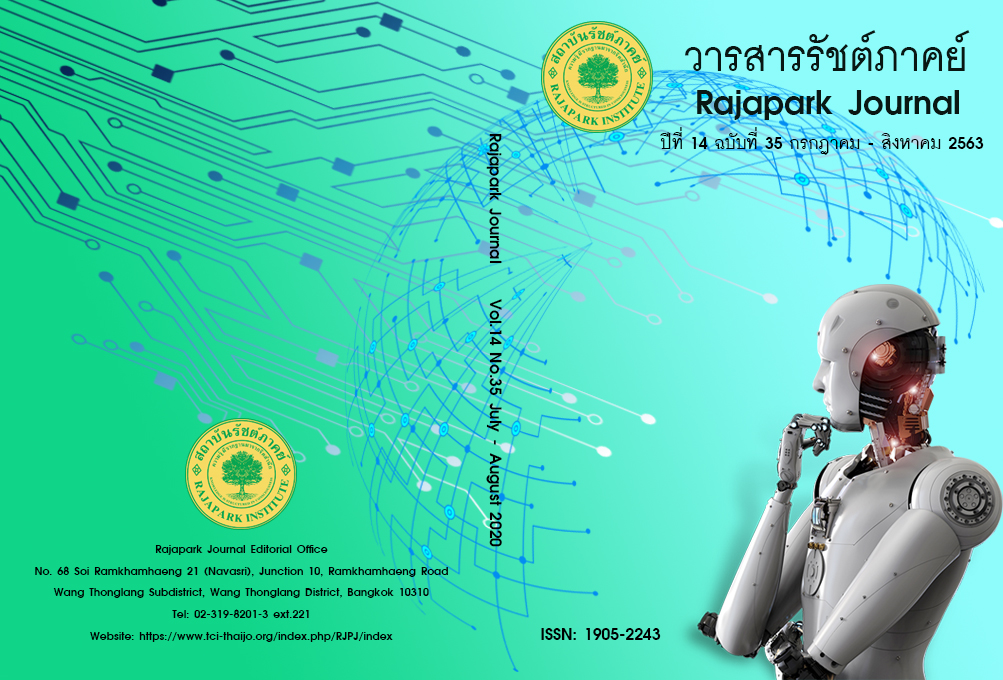Development of Active Learning Instructional Model to Enhance The Ability in Early Childhood Learning Experience Design of Early Childhood Education Students
Main Article Content
Abstract
The purposes of this research were to develop the active learning instructional model to enhance the ability in early childhood learning experiences design, to study the effectiveness of the instructional model developed by the researcher, and to study the satisfaction of early childhood education students towards active learning. The research process was divided into 2 phases: Phase 1, the development of the instructional model, Phase 2, trial and evaluation of the effectiveness of the instructional model. The samples were 24 3rd year early childhood education students in academic year 2019 of the Faculty of Education, Nakhon Phanom University. The statistics employed were mean, standard deviation, and t-test. The results were as follows: 1. the model developed by the researcher revealed the overall effectiveness at the highest level 2. Evaluation results of the effectiveness of active learning model to enhance the ability in early childhood learning experiences design of early childhood education students revealed as follows: 2.1 The learners had higher ability to design learning experiences for early childhood after learning at the percentage of 70 and revealed the statistical significance at the .05 level. 2.2 The learners revealed higher learning achievement in the course of Learning Experiences Management for Early Childhood 1 after learning at the percentage of 70 and revealed the statistical significance at the .05 level. 3.The learners revealed their overall satisfaction towards active learning after the experiment at the high level.
Article Details
Views and opinions appearing in the Journal it is the responsibility of the author of the article, and does not constitute the view and responsibility of the editorial team.
References
Boonphirom, S. (2014). Being a Teacher. Bangkok: Triple Education.
Buddee, D. (2013). Enhancement of Understanding on Momentum and Collision Using Active Learning. Bachelor of Science Thesis. Department of Science Education, Faculty of Science, Ubon Ratchathani University.
Buzan, T., & Buzan, B. (1994). The Mind Map Books: Radiant Thinking. London: BBC. Books.
Chanathip Pornkul. (2012). Design of Learning Management Integrated Reading, Analytical Thinking and Writing. Bangkok: Chulalongkorn University.
Dale, E. (1969). Audio – Visual Methods in Teaching (3rd ed.). New York: The Dryden Press Holt, Rinehart and Winston. Inc.
Dechakup, P., & Yindeesuk, P. (2017). 7C Skills of Teachers 4.0 PLC & Log Book. Bangkok: Chulalongkorn University.
Dewey, J. (1938). Experience and education. New York: Collier Books.
Jintawan, W. (2012). Educational Management of Active Learning in the Subject of Safety Engineering Work, Faculty of Industrial Engineering and Technology Rajamangala University of Technology Rattanakosin Wang Klai Kangwon Campus. Bangkok: Research and Development Institute, Rajamangala University of Technology Rattanakosin.
Joyce, B., Weil, M., & Calhoun, E. (1992). Models of teaching (4th ed.). Boston: Allyn and Bacon: A Divison of Simon & Schuiter, Inc.
Khammani, T. (2014). Knowledge Management Science for Managing Effective Learning Processes (18th ed.). Bangkok: Dansuthakha Printing.
Mihommi, W. et al. (2015). Learning Achievement and Retention in Learning Computer Subject by Using Active Learning Pedagogy and Social Network of Secondary Grade 4 Students. Academic Conference on Active Learning “Learning Innovation”, May 14-15, 2015, 67-78. Retrieved June 23, 2018, from https://alc.wu.ac.th/backEnd/attach/attArticle/Proceeding%202558-69-80.pdf
Ministry of Education. (2011). Bachelor Degree Qualification Standards in Education Programs (Five-year Program). Retrieved May 30, 2018, from http://www.mua.go.th/users/tqfhed/news/FilesNews/FilesNews6/education5year_m1.pd.
Phathtiyathani, S. (2017). Evaluation of Education. Kalasin: Prasarn Printing.
Scott, M. M. (1970). Every Employer a Manager: More Meaningful Work Though Job Environment. New York: McGrow-Hill Book Company.
Sinlarat, P. (2014). Principles and Techniques of Learning Management in Higher Education. Bangkok: Chulalongkorn University.
Yoshida, H. (2016). Effects of Active Learning for curriculum management: with focus on the “courses of study” of Japan. International Journal of Knowledge Engineering, 2(2), 77-84.


